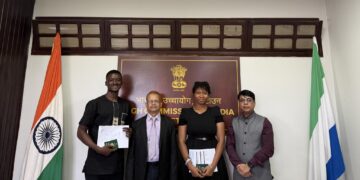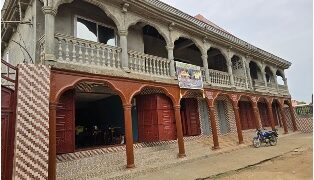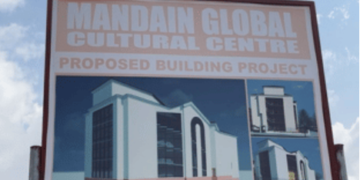By Alpha Amadu Jalloh
Mr. President, here we go again. As you prepare to host your annual media evening with Sierra Leone’s media practitioners, I come with a heartfelt request. This event, no doubt, will be heralded as a demonstration of your government’s commitment to press freedom and media engagement. Yet, Mr. President, we must confront a hard truth: our media is struggling economically, operationally, and morally. It is becoming less of an independent watchdog and more of a “vuvuzela” for political interests, unable to serve the public in the way it should.
Mr. President, Sierra Leoneans are suffering in all aspects of life. Amidst the economic turmoil, the role of the media as a purveyor of accurate, critical, and diverse information is more crucial than ever. Information is life. It shapes opinions, holds power to account, and informs our citizenry. But instead of acting as a beacon of truth, much of our media has been reduced to an echo chamber, an unfortunate consequence of systemic neglect and political interference.
Mr. President, media houses in Sierra Leone lack true independence. This is not solely a question of political alignment; it is also a result of material deprivation. Many media organizations do not have the resources to operate sustainably. Their survival often depends on the goodwill of proprietors, many of whom are politically aligned with your government or your party. These proprietors dictate editorial policies, determining not only what gets published but, more dangerously, what does not.
Mr. President, I am a firm believer in free speech and freedom of association. However, true press freedom is not just about permitting people to speak; it’s about creating an environment where they can speak without fear, manipulation, or economic desperation. When journalists are unable to access resources, they become vulnerable to coercion. A hungry press cannot bite.
Most newspapers in Sierra Leone survive on a shoestring budget. Their revenue comes predominantly from advertisements or, more troublingly, from “paid content” funded by individuals, companies, or political institutions seeking favourable coverage. The lack of a robust advertising market, coupled with the absence of financial independence, means these media houses are perpetually beholden to their benefactors.
Mr. President, how can we expect the press to serve as a voice for the voiceless when it is tethered to the purse strings of a few? How can the media hold your government accountable when its survival depends on government-linked patronage?
Mr. President, your government, particularly through the Ministry of Information and the Media Commission, has a responsibility to address these challenges. It is time to create opportunities for media houses to thrive independently. I want to suggest some initiatives that I believe can be the way forward.
The government printing press, Mr. President, should be modernized and made accessible to all media houses at subsidized rates. Many newspapers today are printed on outdated equipment, resulting in poor-quality publications with limited pages. By upgrading the printing press, you can empower media organizations to produce higher-quality content that is both visually appealing and more substantive.
Set up a fund that media houses can access for capacity-building initiatives. This could include grants for purchasing modern equipment, training programs for journalists, and support for investigative reporting. This fund must be managed transparently, with clear eligibility criteria to ensure it benefits all media houses, not just those aligned with your government, political party, and/or any institution or individual.
Encourage private sector advertising by creating policies that make it easier and more attractive for businesses to advertise in local media. Simultaneously, establish guidelines to ensure government advertising is distributed equitably among media outlets, irrespective of their editorial stance.
Mr. President, strengthen laws that protect journalists from undue influence by proprietors or political actors. The media commission must play a more proactive role in ensuring that editorial policies are not dictated by financial backers.
Mr. President, hosting journalists for an evening of camaraderie is not enough. Real freedom of speech requires an environment where the media can criticize, investigate, and report without fear of retribution or financial ruin. It means accepting dissenting voices and creating space for them, even when they challenge your government.
Too often, Mr. President, I see media houses and journalists pandering to those in power, not out of choice but out of necessity. It is a survival strategy in an environment where dissent can cost them their livelihood or worse.
Mr. President, “Big broda, yu na man wae get style o!” This is your opportunity to show leadership with substance, not just style. Stop posturing as a champion of press freedom while the media suffocates under your watch. Be real. Acknowledge the challenges facing our press and take bold steps to address them.
Mr. President, your government has an obligation to create an environment where the media serves the public interest, not political agendas. This is not about winning the applause of journalists for one evening; it is about ensuring they have the tools, resources, and freedom to serve Sierra Leoneans year-round.
Mr. President, the decline of Sierra Leone’s media mirrors the broader struggles of our society. It reflects the economic hardships that force institutions to compromise their values, the political interference that stifles progress, and the pervasive neglect of critical sectors.
Mr. President, as you stand before the media this evening, I urge you to listen, not just to their applause but to their silent pleas for help. Behind the smiles and handshakes lie the frustrations of a profession that is being undermined at its core. Let this event be more than a showcase. Let it be a turning point. Commit to meaningful reforms that will empower the media to fulfill its role as the fourth estate.
Mr. President, Sierra Leoneans deserve a media that speaks truth to power, that informs and educates, that holds leaders accountable. But for that to happen, the media needs your support not in the form of favours or handouts, but in the form of systemic changes that ensure its independence and sustainability.
The ball is in your court. The pen, as they say, is mightier than the sword. Will you empower it, or will you let it remain a muted “ vuvuzela”? The choice is yours.























